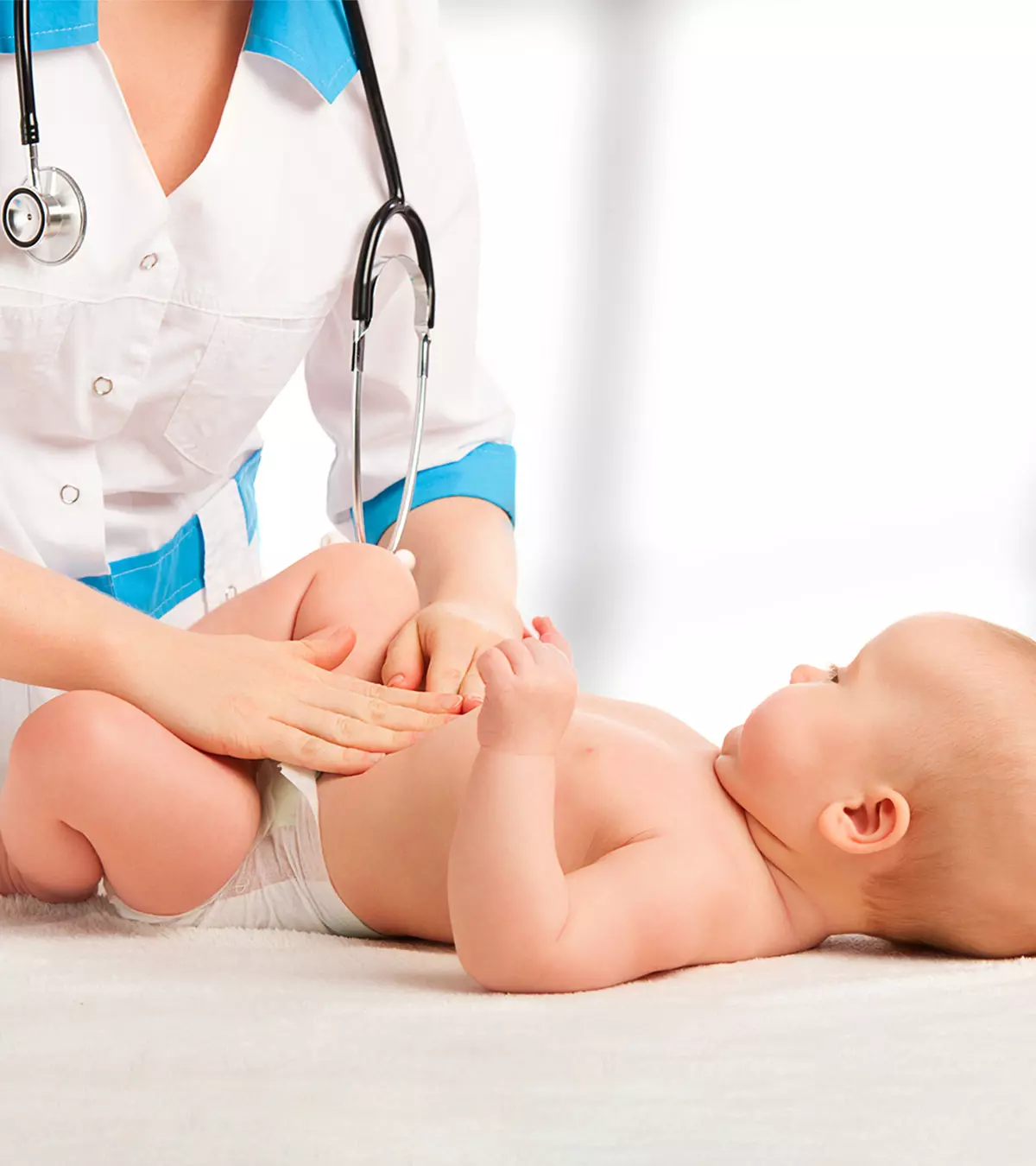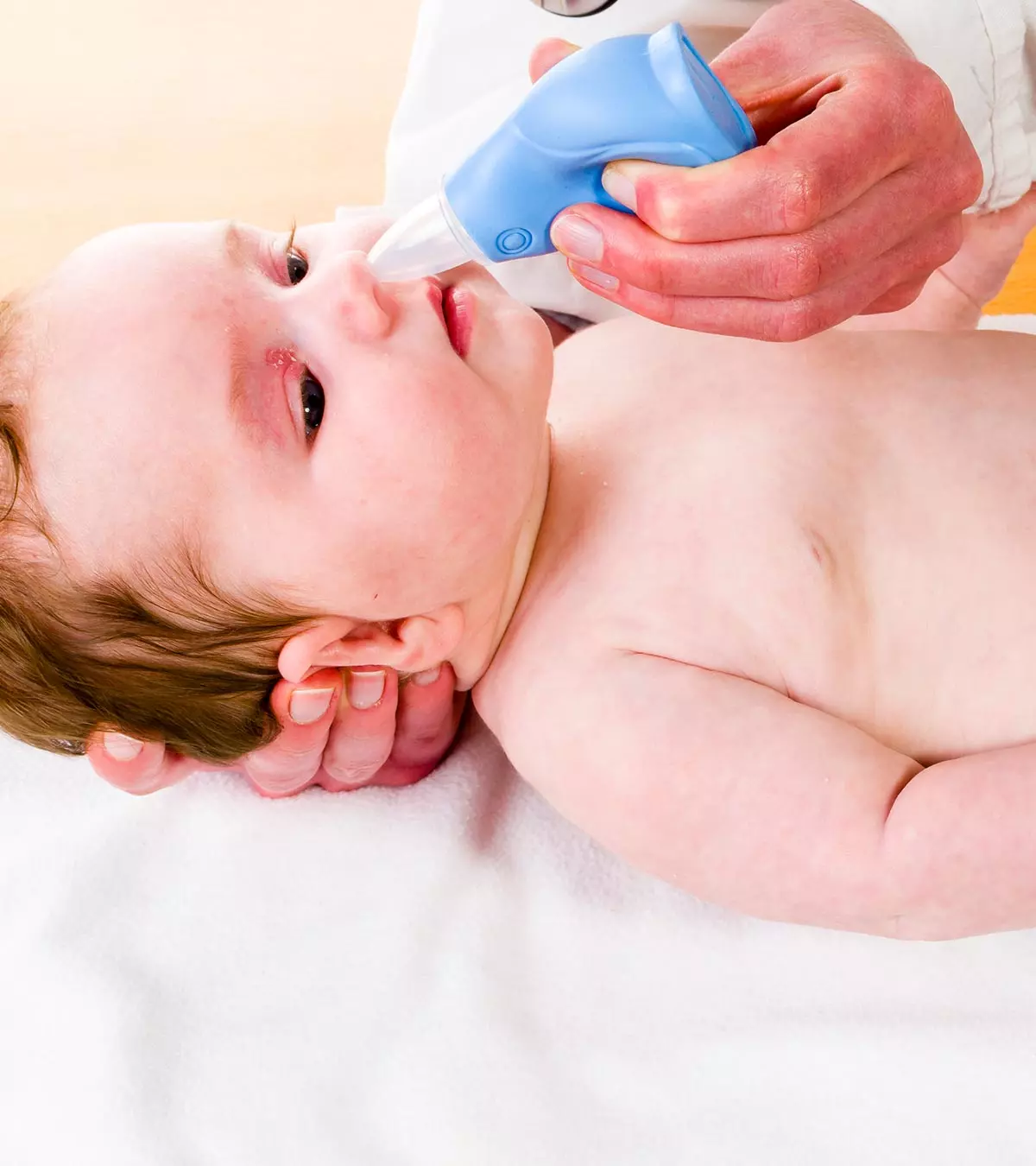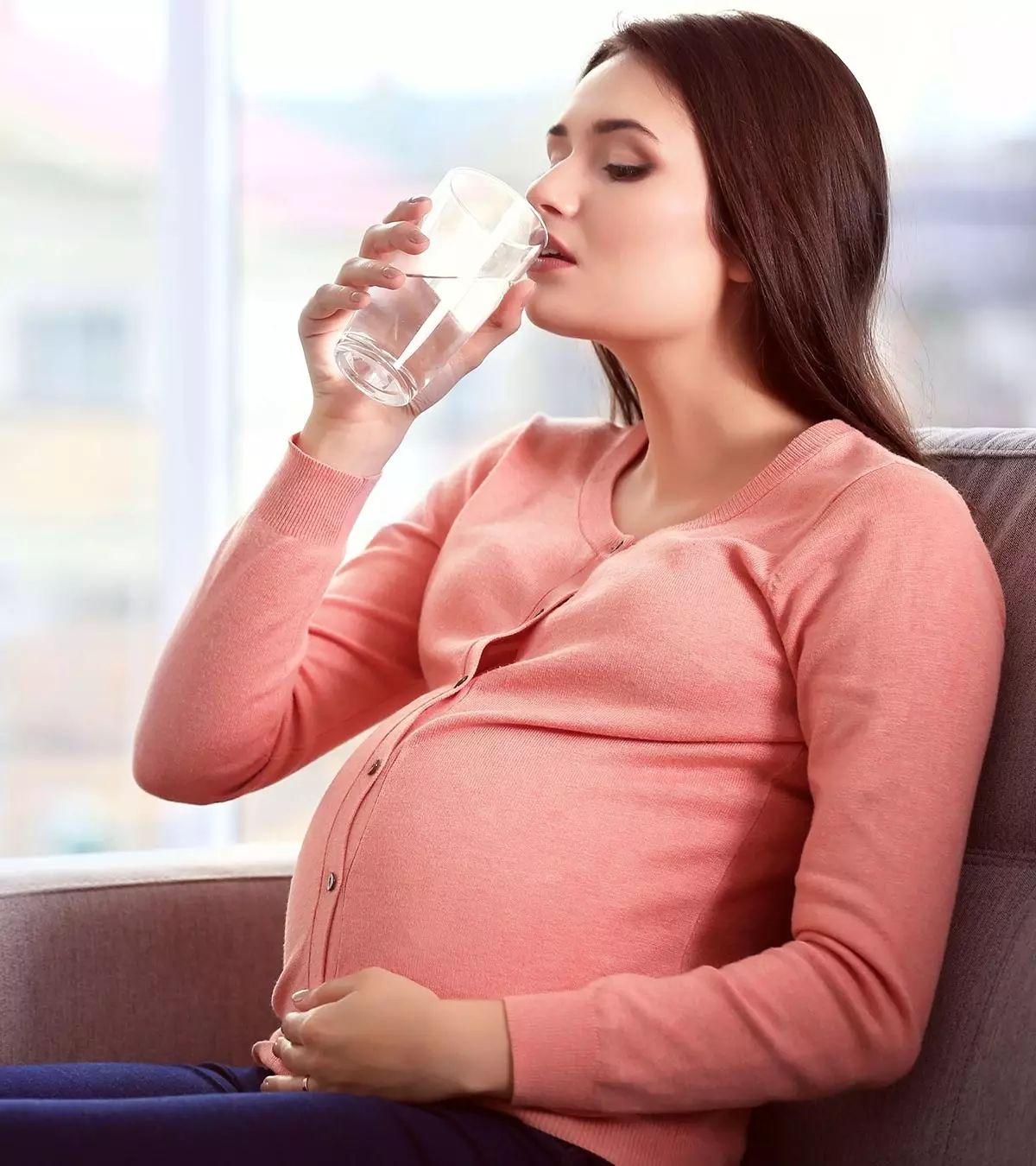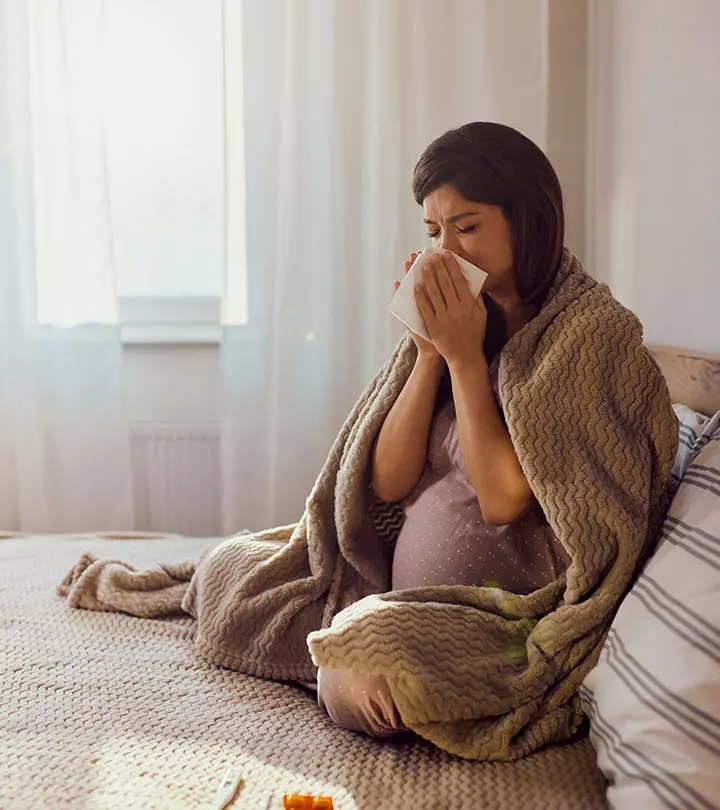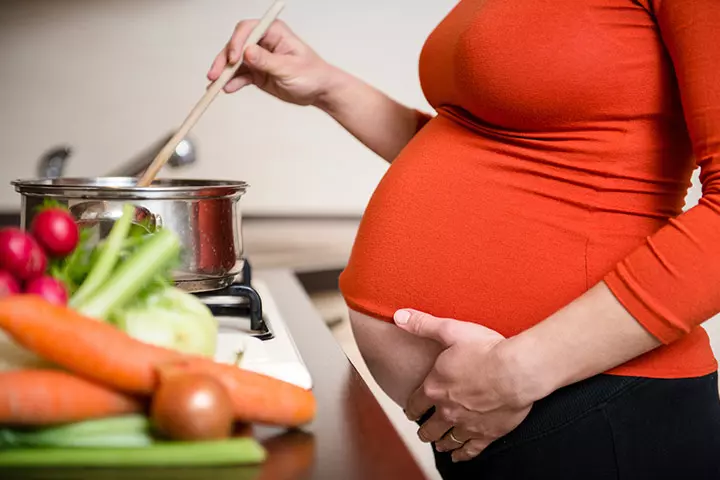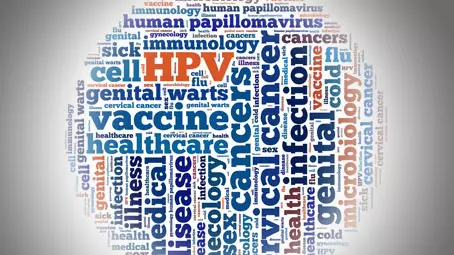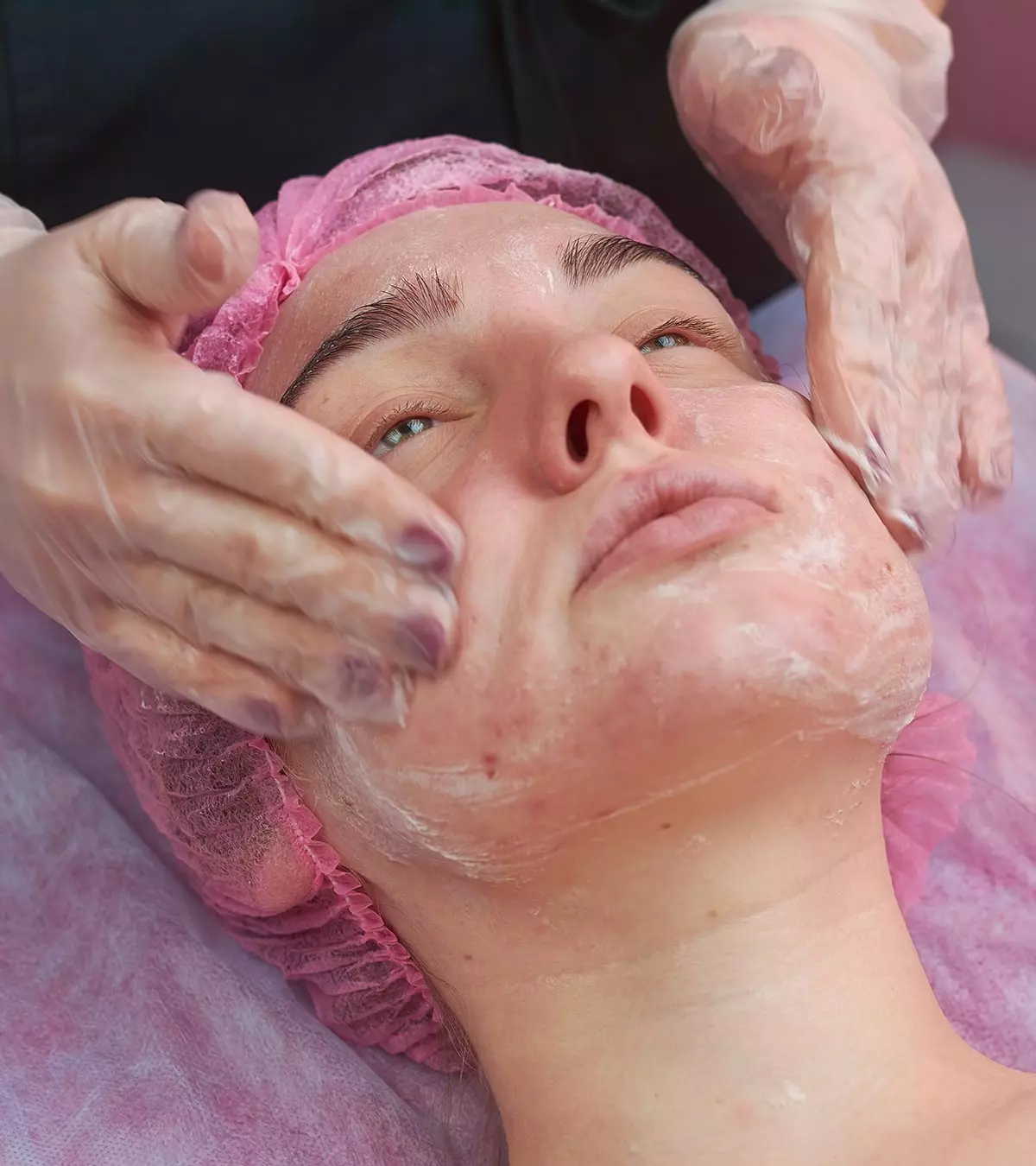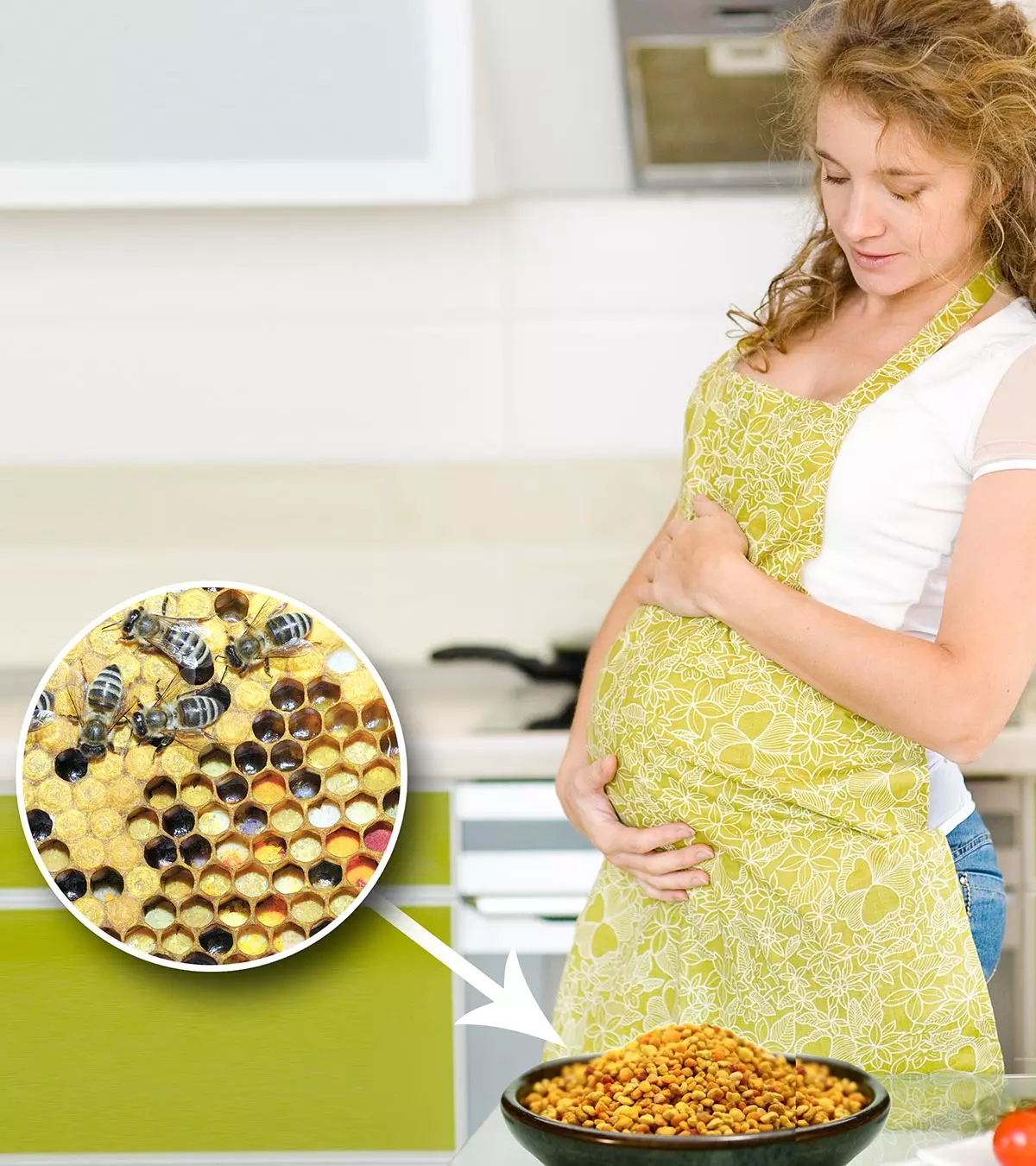
Image: Shutterstock
If you are thinking of consuming bee pollen during pregnancy, it is important to know its benefits and side effects. Bee pollen is a natural substance collected by bees from the male parts of flowers(1). It is full of nutrients and rich in vitamins, minerals, proteins, and antioxidantsiMan-made or natural substances that may prevent or slow down cell damage caused due to harmful molecules called free radicals. , making it a popular supplement for various health benefits(2). Bee pollen is highly nutritious and can be added to foods as toppings. It might benefit pregnant women by reducing the risk of preeclampsiaiA pregnancy disorder characterized by high blood pressure, water retention, and protein content in urine and fetal developmental problems, besides boosting immunity. However, it may also induce allergic reactions and lead to other adverse outcomes. Hence, a doctor’s consultation is necessary before consuming any supplements or special foods during pregnancy. Continue reading to know more about bee pollen consumption during pregnancy, its benefits and safety.
Key Pointers
- Bee pollen can reduce the risk of hypertension and pregnancy-related stress and tiredness.
- It contains essential elements for fetal growth and development, such as minerals, protein, vitamins, and carbohydrates.
- Bee pollen can improve the immune system and protect against nutrient deficiencies.
- A healthy nutritional profile of bee pollen can benefit the overall course of pregnancy.
- Consult a doctor before consuming bee pollen, as it may result in minor allergic responses, digestive issues, and neurological problems.
Benefits Of Bee Pollen During Pregnancy
Bee pollen is a nutrient-rich supplement that can help support both maternal and fetal health by addressing nutritional gaps and boosting overall well-being. Here are a few specific benefits of bee pollen during pregnancy (1) (3) (4) (5):
1. Reduces The Risk Of Hypertension
Bee pollen helps to purify the blood and aid the supply of oxygen to the brain cells. It reduces the risk of high blood pressure or hypertension in women throughout the pregnancy. This is particularly crucial as hypertensive disorders in pregnancy (HDPs) are common and are the leading causes of pregnancy-related mortality in the United States. The overall prevalence of HDP during the combined period of 2017-2019 was 14.6%, as per a report by the Centers for Disease Control and Prevention report (6). Hypertension can spell danger for both the mother and the baby in her womb. Bee pollen also reduces pregnancy blues like stress and fatigue.
 Health fact
Health fact2. Overcomes Development Problems

Bee pollen contains high amounts of protein, carbohydrates, fats, vitamins, minerals, enzymes, and other necessary compounds for fetal development. Therefore, bee pollen can help overcome development problems in the fetus. It boosts the development of the brain and nervous system of the fetus. These trace elements are necessary for baby development, but they can also help prevent congenital disabilitiesiA structural or functional abnormality present from birth if taken before conception.
3. Prevents Nutrient Deficiencies
One of the major benefits of consuming bee pollen for pregnant women is that it keeps mineral and vitamin deficiencies at bay and improves maternal nutrition. Bee pollen is rich in vitamins, proteins, minerals, and amino acids, which help in the growth and development of the baby.
4. Strengthens The Immune System
The high levels of antioxidants in bee pollen act as excellent immune system boosters and strengthen the mother’s immune system without affecting the development of the fetus. It protects pregnant women from cold, flu, and other diseases.
5. Benefits The Body During Pregnancy
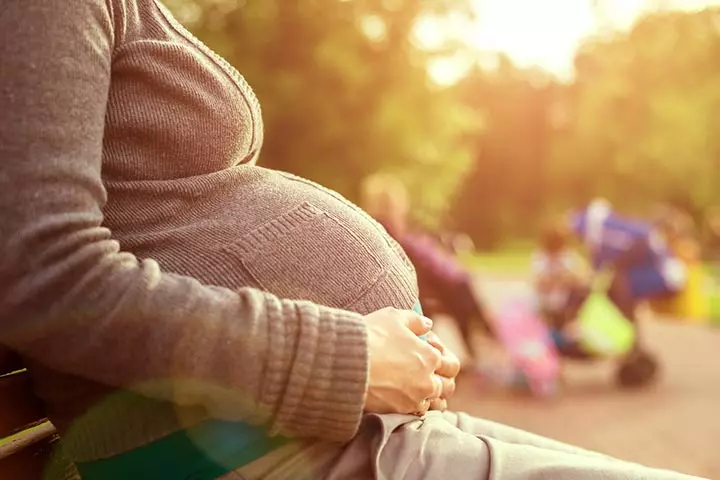
The rich nutritional profile makes bee pollen beneficial for the overall progression of pregnancy. Its anti-inflammatory properties may benefit the health of women with pre-existing inflammatory conditions, such as lupusiA chronic autoimmune disease where the body's immune system mistakenly attacks healthy tissues, causing widespread inflammation. . Bee pollen may also help prevent miscarriage and premature birth by strengthening the uterine muscles and preventing premature contractions.
Studies assessing the benefits of bee pollen in pregnant women are scarce. But animal studies show that bee pollen can indeed be beneficial for both maternal and fetal health. A study report on rats states, “Pollen-fed dams in both groups (A) and (B) had greater body weight and higher levels of hemoglobin, total protein, serum iron and albumin. Fetuses of pollen-fed dams had greater body weight and lower death rate. No gross external, visceral and skeletal malformations were observed in the fetuses. These results suggested that bee pollen could improve maternal nutrition without affecting normal fetal development. It is a practical and effective nutrient during pregnancy (4).”
Precautions for Taking Bee Pollen During Pregnancy
Although bee pollen has potential health benefits, it is generally not recommended for pregnant women. Hence, it is important to approach its use during pregnancy with caution. Understanding the risks before adding it to your diet is vital. Here are some precautions to keep in mind.
- Potential allergic reaction
Some of the side effects of Bee pollen include allergic reactions, gastrointestinal problems, and neurological problems. Allergic reactions may manifest in the form of nausea, rashes, breathlessness, and swelling of the lips, face, or other areas (8). While these side effects are generally mild and affect only some people, there is also a rare possibility of an extreme allergic reaction or anaphylaxis (9). But if you experience any of these side effects, then stop consuming Bee pollen immediately and seek medical help. Women with a family history of allergies should avoid taking Bee pollen. You should avoid giving Bee pollen to children who are less than a year old as it can cause botulism, a dangerous paralytic illness. - Take in moderate quantities
According to the findings of a research performed on rats at the Radioisotopes Department, Cairo, Egypt, bee pollen should only be consumed in low or moderate amounts during pregnancy (10). High doses may pose risks, particularly during the early stages of pregnancy. To minimize potential risks, consult your doctor and limit consumption to safe, moderate levels. - Ensure quality and purity
Make sure to choose quality products that have been tested to meet standards for microbiological purity and the absence of harmful contaminants. Research has shown that pollen from certain plants may have hepatotoxic effects, posing risks to liver health (11). To avoid these dangers, ensure that the bee pollen you consume is sourced from a reliable and certified supplier that adheres to safety and quality standards. - May stimulate uterus
Bee pollen might stimulate the uterus and could threaten the pregnancy (12). It is advisable to avoid using bee pollen while pregnant or consult a doctor before use. - Medication interactions
Bee pollen may interact with certain medications, such as warfarin (Coumadin). It could increase the effects of warfarin, raising the risk of bruising or bleeding (12).
Talk To A Doctor

Although Bee pollen is a natural substance, and you might have heard people taking Bee pollen for fertility or other health reasons, you must consult your doctor before using it during pregnancy. Your doctor will check your medical history to find out if you are prone to allergies. Expecting mothers can safely use cream and lotions that contain Bee pollen.
Frequently Asked Questions
1. Are there any risks associated with consuming bee pollen during pregnancy?
Yes, consuming excess bee pollen during pregnancy may stimulate the uterus, leading to premature labor or potential harm to the pregnancy (12).
2. Can bee pollen interact with other medications or treatments taken during pregnancy?
Yes, bee pollen may interact with warfarin during pregnancy, increasing the risk of bruising or bleeding (12).
3. Are there any alternative natural remedies that pregnant women can use instead of bee pollen?
Brewer’s yeast, which has a similar protein content to bee pollen and is rich in vitamins, is often used as a substitute for bee pollen (13). It also shares some of the same benefits of bee pollen, such as reducing the risks of hypertension and protecting against colds, flu, and other diseases (14).
Consuming bee pollen during pregnancy could be safe and beneficial, provided you take care of certain precautions. The bee pollen is nutrient-rich and may prevent the risk of high blood pressure and fetal abnormalities in pregnancy. However, certain toxic components and impurities could pose a risk of adverse reactions and health issues in the expectant mother and her unborn. Therefore, it is important to avoid products that contain pesticides, herbicides, or toxic metals and choose high-quality bee pollen while purchasing. Nevertheless, it is crucial to take your doctor’s opinion about the safety of taking bee pollen while pregnant.
Infographic: Potential Advantages Of Consuming Bee Pollen In Pregnancy
During pregnancy, most women are concerned about whether or not the foods they eat can harm their unborn babies. However, bee pollen is considered a healthy food and a cure for several ailments. Read this infographic to learn about its various benefits for pregnant women.

Illustration: Momjunction Design Team
Illustration: Is Bee Pollen Safe During Pregnancy?

Image: Stable Diffusion/MomJunction Design Team
References:
- Syed Ishtiaq Anjum et.al; (2024); Bee pollen as a food and feed supplement and a therapeutic remedy: recent trends in nanotechnology.
https://www.frontiersin.org/journals/nutrition/articles/10.3389/fnut.2024.1371672/full - Bożena Denisow and Marta Denisow-Pietrzyk; (2016); Biological and therapeutic properties of bee pollen: a review.
https://scijournals.onlinelibrary.wiley.com/doi/10.1002/jsfa.7729 - Asmae El Ghouizi et.al; (2023); Bee Pollen as Functional Food: Insights into Its Composition and Therapeutic Properties.
https://pmc.ncbi.nlm.nih.gov/articles/PMC10045447/ - Y Xie et.al; (1994); Effect of bee pollen on maternal nutrition and fetal growth.
https://pubmed.ncbi.nlm.nih.gov/7744390/ - Shaden A M Khalifa et.al; (2021); Bee Pollen: Current Status and Therapeutic Potential.
https://pmc.ncbi.nlm.nih.gov/articles/PMC8230257/ - Hypertensive Disorders in Pregnancy and Mortality at Delivery Hospitalization — United States, 2017–2019.
https://www.cdc.gov/mmwr/volumes/71/wr/mm7117a1.htm - Bee Pollen.
https://www.urmc.rochester.edu/encyclopedia/content?contenttypeid=19&contentid=BeePollen - Bee Pollen: What It Is and Why You Really Don’t Need It.
https://health.clevelandclinic.org/bee-pollen-benefits - Jeong Hee Choi et.al; (2015); Bee Pollen-Induced Anaphylaxis: A Case Report and Literature Review.
https://pubmed.ncbi.nlm.nih.gov/25749764/ - Eman I. AbdEl-Gawad; (2010); Potential impact of bee pollen administration during pregnancy in rats.
https://www.jofamericanscience.org/journals/am-sci/am0605/07_2457_am0605_44_53.pdf - Maria Graça R. Campos et.al; (2010); What is the future of Bee-Pollen?
https://ibra.org.uk/wp-content/JAAS/VOL2/2-4/JAAS%202%204%2001L%20%25281%2529.pdf - Bee Pollen.
https://medlineplus.gov/druginfo/natural/78.html - Pollen Substitutes and Supplements
https://www2.gov.bc.ca/assets/gov/farming-natural-resources-and-industry/agriculture-and-seafood/animal-and-crops/animal-production/bee-assets/api_fs411.pdf - Brewer’s yeast.
https://www.mountsinai.org/health-library/supplement/brewers-yeast#:~:text=Brewer’s%20yeast%20is%20a%20rich
Community Experiences
Join the conversation and become a part of our nurturing community! Share your stories, experiences, and insights to connect with fellow parents.
Read full bio of Reda Elmardi
Read full bio of Ria Saha
Read full bio of Swati Patwal
Read full bio of Dr. Joyani Das











